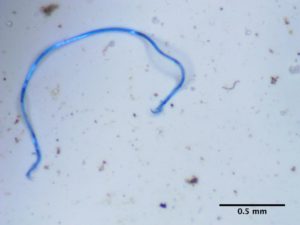 There have been a number of studies finding microplastics (tiny bits of plastic smaller than 5mm) in seafood, drinking water, many foods, as well as in the air we breathe (e.g. from the breakdown of vehicle tires and brakes during normal use). There has been some concern over what the microplastics are doing to us because so little research has been done. But there is worry that the smallest sized microplastics are entering our bodies, traveling to different organs, and causing damage. But at least some of the microplastics we ingest are traveling through the gastrointestinal system and then excreted in our stool, according to a recent study.
There have been a number of studies finding microplastics (tiny bits of plastic smaller than 5mm) in seafood, drinking water, many foods, as well as in the air we breathe (e.g. from the breakdown of vehicle tires and brakes during normal use). There has been some concern over what the microplastics are doing to us because so little research has been done. But there is worry that the smallest sized microplastics are entering our bodies, traveling to different organs, and causing damage. But at least some of the microplastics we ingest are traveling through the gastrointestinal system and then excreted in our stool, according to a recent study.
The study had 8 healthy volunteers from Europe and Asia (United Kingdom, Italy, Japan, Poland, Russia, Netherlands, Finland, and Austria). keep a food dairy for a week, and then "donate" a stool sample which was analyzed. None of the volunteers were vegetarians, and 6 had consumed fish from oceans in that week. [Note: Studies find that seafood contains microplastics.]
The stool samples were analyzed for 10 types of plastic. All the stool samples contained microplastics, with polypropylene and polyethylene terephthalate being the most abundant. The samples contained an average of 20 microplastic particles per 10 g of stool. Since 9 types of plastic was detected in the stool, the researchers say that means they come from multiple sources.
Recently Canadian researchers estimated that annual consumption of microplastics ranges from 39,000 to 52,000 particles (depending on age and sex). When they added in inhalation of microplastic particles, the numbers increased to 74,000 to 121,000. And those who only drink bottled water may be getting an additional 90,000 microplastics (versus about 4000 microplastics from tap water). Yikes!
What to do if this concerns you? Since plastic wrappers, containers, and bottles (including water bottles) shed microplastics, then one can try to purchase and store foods in plain cardboard or glass containers. Stainless steel containers are also OK (NOTE: aluminum cans are usually coated with suspect chemicals). Definitely drink more tap water, and less bottled water.
From Medical Xpress: Microplastics detected in human stool
Philipp Schwabl, M.D., from the Medical University of Vienna, and colleagues conducted a prospective case series in which eight healthy volunteers aged 33 to 65 years completed a food diary and collected stool samples according to instructions. Fourier-transform infrared microspectroscopy was used to analyze the presence and shape of 10 common types of microplastic in stool samples following chemical digestion.
The researchers found that all of the stool samples tested positive for microplastics. Per 10 g of human stool, a median of 20 microplastic particles were identified. Nine types of plastic were detected overall; the most abundant were polypropylene and polyethylene terephthalate.
"This small prospective case series showed that various microplastics were present in human stool, and no sample was free of microplastics. Larger studies are needed to validate these findings," the authors write. "Research on the origins of microplastics ingested by humans, potential intestinal absorption, and effects on human health is urgently needed."
